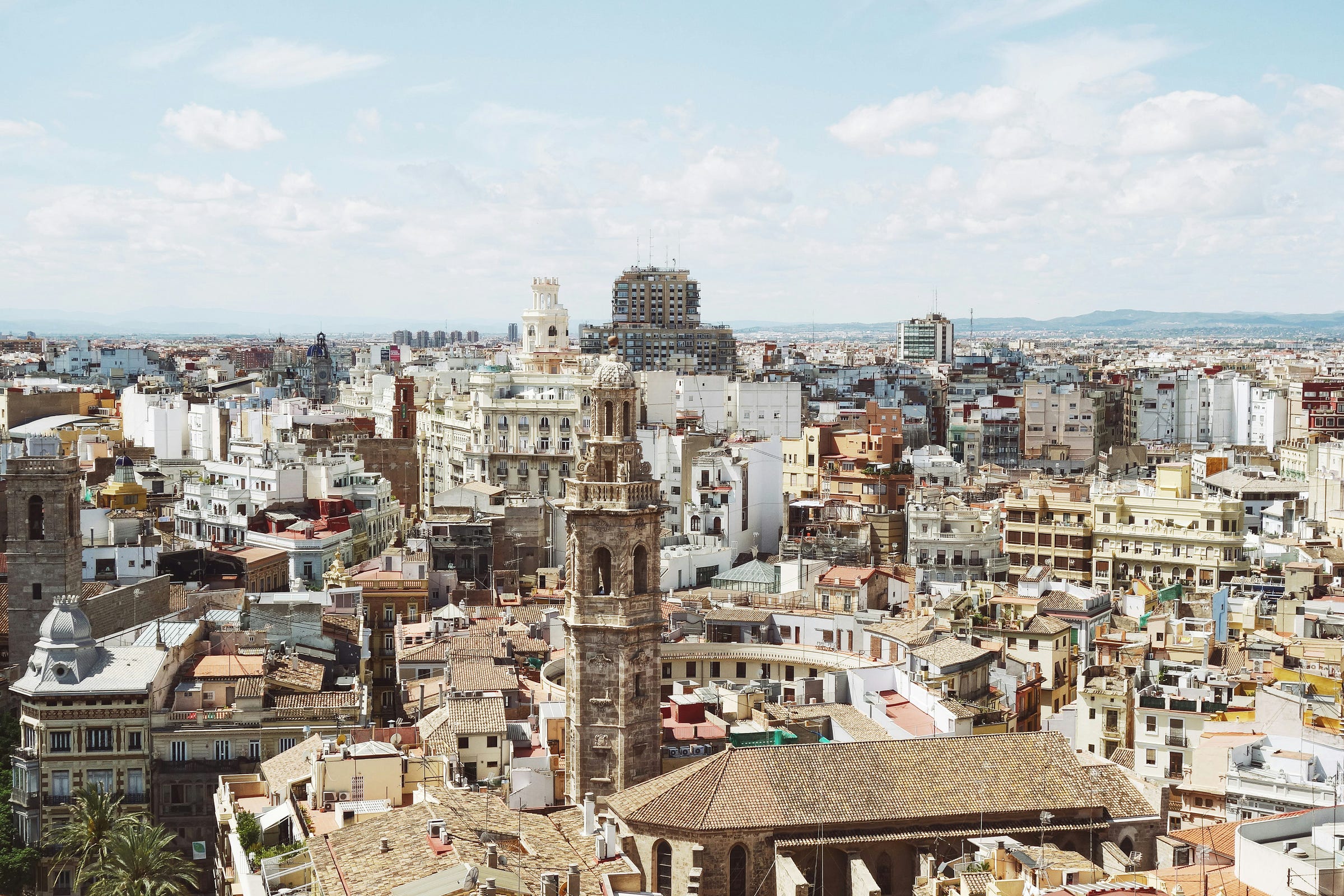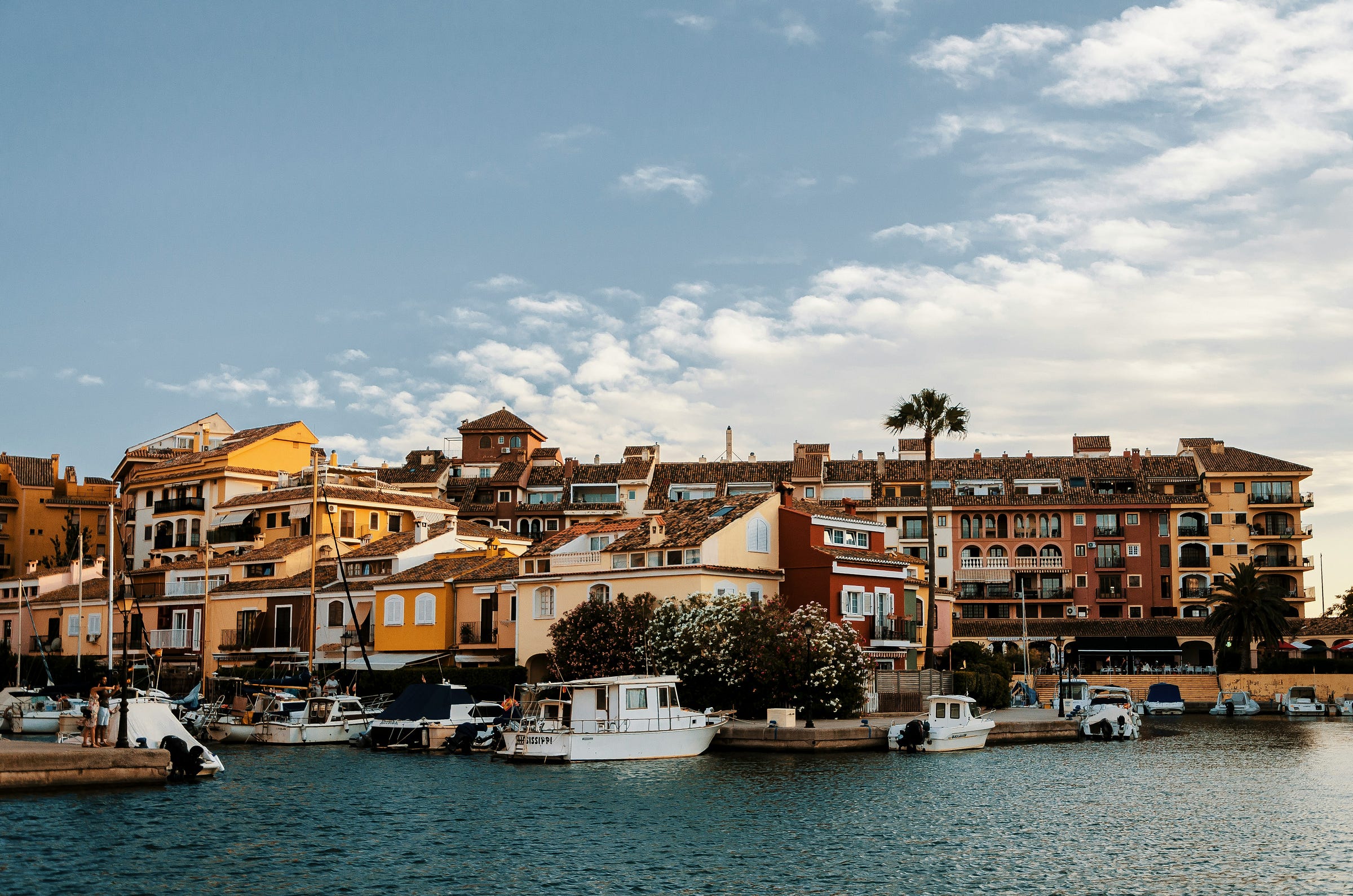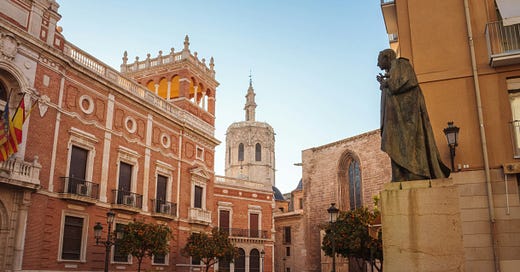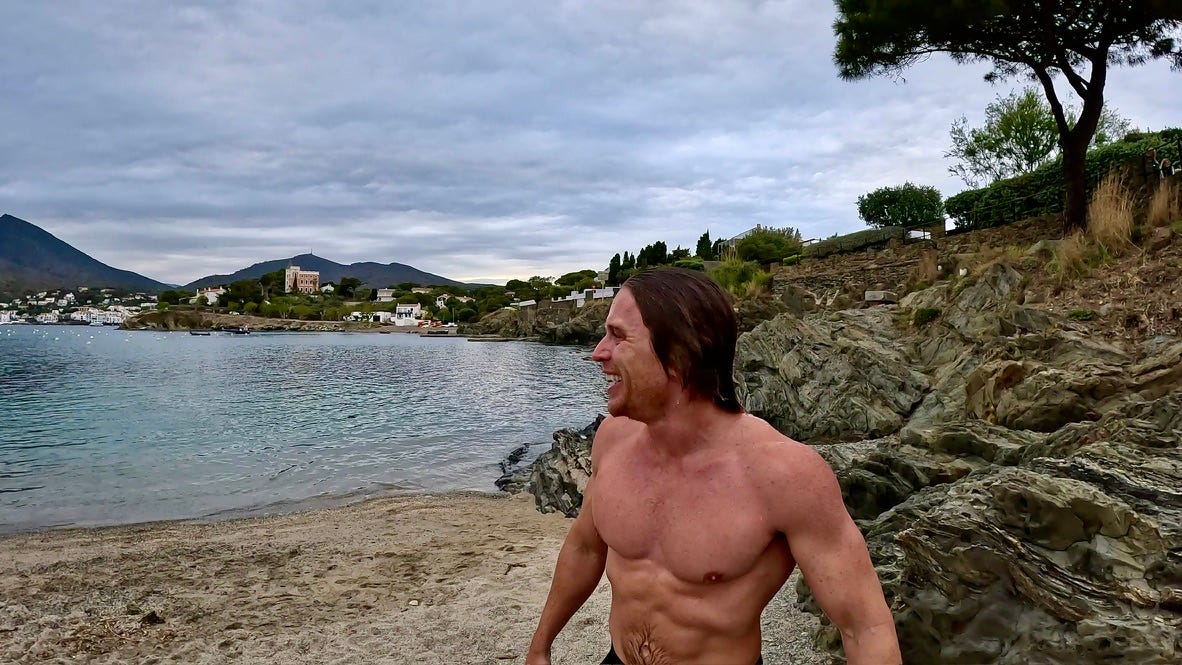'I Don't Think I've Ever Experienced Culture Shock'
Nolan Yuma joins me to talk terrace culture and extended holidays in Spain
Welcome to Wanderlust Salon, a monthly travel series about new places, new experiences, and new perspectives. Each month we meet up with a different guest to explore a corner of the globe that’s left a permanent mark on their heart.
has a catchphrase: salir de las fronteras que impone tu mente—to break free from the borders that limit your mind.This makes sense coming from someone who has led an effectively border-less life. A Belgian-Canadian citizen who was born in Santiago de Chile and now lives in a small city in Valencia, Nolan is a classic third-culture kid. He explores ideas that transcend false boundaries in
, which, true to form, he publishes in both English and Spanish. Nolan is the sort of person willing to have his views changed by new experiences—and for that reason, he never stops seeking them out. Those new experiences could be as big as committing to slow, deep travel, or as small as tasting a crema Catalana.“The dismantling of my belief system started with the crackling of caramelized sugar. Then came the creamy custard with the tiniest curdles that showed its homemade freshness,” Nolan writes in an in-depth exploration of Catalán separatism, an ethno-nationalist ideology he once categorically rejected. But Nolan is nothing if not free-thinking and malleable. He continues, “the velvety texture almost had me, but it wasn’t until the notes of lemon zest and cinnamon hit me that I understood Catalonian separatists.” Nolan encourages his readers to adopt this same attitude, breaking free of tribalism and national identity to see the world through the eyes of others.
But for this interview, I asked Nolan to do something different: to scope down his global focus and tell me all about Spain, his adopted home for the past five years. When I asked what he loves most about it, he pointed to Spain’s terrace culture. “People don’t live in homes; they live on streets,” Nolan says. “People from all generations get together, drink, eat, love, and laugh in plastic chairs and tables they bring down from their homes.”
How fitting, that Nolan’s favorite thing about Spain would be something that melts the divides between ages, classes, and public and private lives, a borderless sphere unto itself. There is a common thread here, one that I sense permeates Nolan’s worldview and which we would all do well to remember: that when we reach out to those who seem different from us, we tend to find that superficial barriers aren’t very meaningful at all.
Nolan’s relationship recently ended after five months, and he’s going to take a break from Spain to journey across Europe, promoting slow travel and various cultural perspectives about mental health. He will be diving deeper into what he’s always done—endeavoring to live life outside his comfort zone and to grow from new experiences. “All we can offer the world is the best version of ourselves,” Nolan says, “and I believe this journey is my way to do just that.”
Read on for more of Nolan’s highly original takes on Spain!
Thank you so much for being here, Nolan! Tell us about your personal connection to Spain. I understand it’s your current home—how much time have you spent there, and why?
My personal connections to Spain started before I was born, through my parents’ stories in Tenerife. They rose to the top of the tourist sector in the 70s, just as the Canary Islands tourism market kicked in. My mother took care of the logistics, and my father was the ‘king of the island’ as he was the most popular tour guide and always shared his cash tips with the bus drivers—something the other whities from up north didn’t bother doing. It didn’t take long for them to be taken in as a family, but once they left, they never wanted to return. Seeing how the classless-lets-get-drunk-in-giant-cheap-resorts vibe took over the South would break their hearts.
Although the culture of tinerfeños (people from Tenerife) differs from that of peninsulares (people from the Iberian Peninsula/mainland), my parents always connected to Spain’s culture more than the culture of where they raised me, Canada.
The next connection started with my grandpa, who built a family home for all his kids and grandkids near Estepona—the locals knew him as “Don Enrique.” I went there every four to six years since I was nine.
Then, at 27, I packed one suitcase, thinking I’d spend a year in Spain for a teaching job en el culo del mundo, Segorbe, and return to Canada. Then COVID-19 happened. Five years later, I’m still here in Valencia, now with an apartment and evergrowing connections.
Of course, curiosity recently got the best of me, and against my parents’ advice, I went to Tenerife. I met one of their old friends who took me to the apartment my parents lived in, which is now filled with ocupas (squatters). The South, indeed, broke my heart. However, the north of Tenerife is one of my favourite places on earth. The way the cliffs drop and lush forests leak into the ocean is similar to Hawaii but without the American vibe of conflict and unaffordable lodging for those who don’t make six figures.
What is your favorite thing about Spain? What makes it unique? Tell us about the sights, smells, and tastes!
This is such a basic answer, but what keeps me here is the terrace culture—all of it. Every terrace, even the ones on the side of a highway have something to offer. The jaleo, or a constant mixture of clashing music, football games, soap operas, and conversation, can drive me crazy, but at the same time, it keeps me alive.
The best thing of all is that terrace culture isn’t seasonal. Sure, it fills up with guiris (white-ass foreigners) in the summer, but there’s always something going on. People don’t live in homes; they live on streets. Even a town en culo del mundo with limited bars will figure out a way to live on the streets. People from all generations get together, drink, eat, love, and laugh in plastic chairs and tables they bring down from their homes. Unlike North America, there’s no generational gap. Kids play in the street while teenagers make out, parents get tipsy, and abuelos share stories from the past.
The only time the streets are quiet is between 16:00 and 19:00 when people are taking a siesta, which doesn’t actually mean taking a nap. It means watching TV.

Have you experienced any moments of significant culture shock in Spain?
I’ve lived in five countries and travelled to around 30, and I don’t think I’ve ever experienced culture shock. We are products of our culture, and as a third-culture kid, that product turned out to be a shattered jug. I’ve managed to pick up the pieces and glue them together as a mosaic, but what fills and pours out of me are new experiences. I could say I always step outside my comfort zone, but I don’t know where it is yet.
What is something about Spain that those who haven’t been there might not expect? What do you want people to know about it?
The very unequal socialist system. Does that sound contradictory? Well, I’m autonomo (self-employed), which means I used to pay 60 euros a month on top of taxes even if I made no money for the first year. Now, I pay 275 euros a month even if I make no money. So yes, the tax system is unique here, especially for small businesses. It’s a socialist country where the less money you make, the higher percentage of money goes to taxes if you’re autonomo. In other words, the richer you are as autonomo, the less percentage of your money goes to taxes…I don’t see the socialist aspect either.
The drinking culture! I wrote an article, “Morning Drinking for Egalitarians,” and talked about it in my podcast episode “How Culture Affects Health” with Paul Dermody. Although Spain has more bars per inhabitant than any other EU country, and it’s acceptable to drink beer, wine, or even a shot with breakfast, the drinking culture has had a healthy effect on me. It’s not like Anglo cultures where people drink quickly to get wasted.
Napkins under your food.
In many small towns, you won’t find food (aside from olives) between 16:00 and 19:00. The kitchens are closed.
…the list could go on for a while, depending on which culture you’re from. However, getting used to the lifestyle isn’t difficult here. Getting used to tardiness, endless holidays, molasses-moving bureaucracy, and anything business-related still makes it difficult to settle down here, though. A last minute cancelation with the excuse “it was a holiday and today I have puente” is something I’ve heard hundreds of times. Puente is when you have a saints (it’s always saints) holiday on a Monday and Wednesday, so you also take Tuesday off.
What are your favorite Spanish foods and why? Are there any dishes that bring back special memories? (I still dream about a trip to Sevilla in college, where I ingested ungodly amounts of croquetas, Spanish tortillas, and tinto de verano!)
There’s nothing like jamón iberico de bellota—ham from Iberican pigs that only eat acorns.
If I had 24 hours in Spain and travel time wasn’t a factor, how would you tell me to spend it?
Spain has so much to offer, from world-class rock climbing, surfing, and hiking to an unbeatable nightlife and food scene. If you want to experience a local scene, come visit me in El Grao de Castellon. I’d be happy to act like your tour guide, so we can hike, swim, eat, drink, and dance until you catch your flight in the morning.

When you’re traveling, is there a version of yourself that takes center stage? Who are you when you’re traveling that you’re not when you’re at home?
I feel more myself. My senses are heightened, I’m in the moment, my ego’s left behind and through the arduous aspects of travel, I find more layers of myself and peel off the parts that no longer serve me…kind of like a mushroom or acid trip, but with more stories to tell.
Do you make efforts to travel “ethically”? What does that mean to you?
Slow travel. I wrote about the environmental, psychological, and spiritual effects of slow travel in “Does Everyone Need to Travel?” I don’t make as much of an effort as some people—I’ll take a five-hour flight over a two-week sail to cross the Atlantic, but once I get to a place, I bike, take public transit, or, if it’s part of the culture like in Vietnam, become part of the chaotic but fully functioning swarm of motorbikes. I usually try and stay in a country for at least one month, and if I visit a city for a weekend by myself, I only walk, no matter the weather.
What are your favorite quintessentially Spanish books and movies that readers should check out?
No voy a pedirle a nadie que me crea (I Don’t Expect Anyone to Believe Me) by Juan Pablo Villalobos. He’s Mexican, but the book is partially set in Barcelona and he lives in Barcelona. The story is full of dark, sardonic wit.
Wrong Side of The Tracks is a series on Netflix. One of the main characters acts horribly, but the rest are incredible. The themes of race and class spill out from the plot and character arcs naturally.
I’m sure everyone knows of Pedro Almodovar, but most of his movies are incredible. One of the best is Todo sobre mi madre. It’s a must-see classic.
8 apellidos vascos is another famous movie here in Spain. I didn’t enjoy it too much, but it’s a must see to get a sense of what the mainstream public watches.
Thanks again for so openly sharing about your life in Spain, Nolan! Subscribe to Born Without Borders for more culture, politics, and stories from a borderless world.
In case you missed it:
In the past couple weeks, I wrote about trying use travel to outrun my depression (spoiler alert: it didn’t work) and released the first tranche of my Caravaner’s Companion travel guides—where I whisk you around the world like any over-caffeinated, donut-obsessed best friend would—for paid subscribers. This season, I’m taking you to Portugal, Guatemala, and Egypt. If you enjoy my essays, I think you’ll love these guides. Upgrade below to unlock them.
Reader, I’m curious…
Do you make a concerted effort to travel slowly and deeply? Have you ever experienced significant culture shock, or are you as unfazed as Nolan? Do you love jamón iberico (please note that there is a correct answer)?? Tell us in the comments!











Great interview with Nolan, himself a great guy who introduced us to crema Catalana! And he's 100% right about Spain's wonderful terrace culture.
I’d like some jamón iberico now, please…